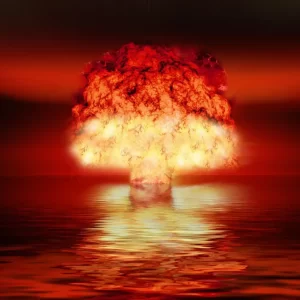- Introduction
- 🧠 Mindset: The Emotional Core of Survival
- 🧰 Preparation: Your Shield
- 💥 During the Blast: Seconds to Decide, Lifetimes at Stake
- 🏚️ After the Blast: The Critical First 48 Hours
- 📌 Community Strength: The Unsurpassed Advantage
- 🧭 Long-Term Resilience
- 🌟 Final Words
- Conclusion
- Frequently Asked Questions (FAQs)
- Question for you
- Author
Introduction
A nuclear explosion—whether caused by war or accident—is one of the most devastating events imaginable. As a result, being prepared isn’t an overreaction; rather, it’s a crucial step toward survival. In light of rising tensions in South Asia, this nuclear survival guide offers a clear, practical, and emotionally grounded approach. It is specifically designed to help people in India stay safe before, during, and after a nuclear event. One of the worst things that can happen. Being prepared isn’t overreacting—it’s staying safe. With growing tensions in South Asia, this guide gives clear and practical survival tips for people in India.

🧠 Mindset: The Emotional Core of Survival
Survival begins long before the blast—it starts within. Fear is a natural reaction, but with the right knowledge, it can be turned into focused action. In a crisis, how you think matters as much as what you do. That’s why mental preparation is just as critical as physical readiness. Train your mind now to respond with clarity, not panic, because when every second counts, a calm mindset can save your life.
1
Stay Calm Under Pressure
⚠️ Panic is Deadlier
Panic kills faster than radiation and clouds judgment in a crisis
🧘 Stay Calm, Stay Safe
Train yourself to stay calm and think clearly—your mindset matters
🕒 Think Fast, Stay Smart
Keeping cool helps you make smart decisions when every second counts
2
Believe In Survival
💪 Defy the Odds
Your actions can defy the odds and shape your survival
🧠 Mind Over Fear
The right mindset helps you stay strong in the worst situations
🎯 Decide to Survive
Smart choices in critical moments can make all the difference
3
Prepare With Purpose
🔁 Act Early
Every minute before a blast is a chance to act and prepare
🔮 Shape Your Future
What you do now can reshape what comes next
⏱️ Every Second Counts
In survival situations, even a moment can make the difference
🧰 Preparation: Your Shield
Hence, preparing your home and body can mean the difference between life and death.
📦 Emergency Kit Essentials:
- 3–5 days of clean water (3–4 liters/person/day)
- Non-perishable food
- First-aid kit with burn cream and painkillers
- Battery-powered or hand-cranked radio
- Flashlight with spare batteries
- N95 masks and heavy-duty gloves
- Potassium iodide tablets (protect your thyroid from radiation)
- Soap, garbage bags, plastic sheets, and duct tape
🏠 Shelter Smart:
- Identify the safest place at home (basement or windowless room).
- Strengthen windows with plastic or heavy drapes to reduce blast damage.
- If in an apartment, choose the middle floor, away from the outer walls.
💥 During the Blast: Seconds to Decide, Lifetimes at Stake
First, a searing flash of light appears, followed by a powerful wave of destruction.
🔊 Follow Official Instructions and Seek Shelter Immediately
Here’s what to do during a Nuclear Explosion:
- Listen to the updates from emergency services and follow their directions carefully.
- If you hear a nuclear attack warning, find shelter immediately — the best option is an underground space. You should stay there until officials say it’s safe to leave.
- Go as deep underground as possible. If that’s not an option, move to the center of a large, tall building to put more walls between you and the outside.
- Turn off fans, air conditioners, and heating systems that bring in outside air. Fireplace dampers must be closed to stop outside air from coming in.
- Stay indoors during the entire period of highest radiation, which occurs right after the blast. Radiation levels drop quickly over time, but are very dangerous at first.
- Depending on the situation, plan to remain inside for at least 24 hours — possibly longer. In some cases, you may need to stay indoors for up to a month or so.
- If evacuation becomes necessary, authorities will inform you and provide instructions through all available communication channels.
If an attack warning is issued, take cover as quickly as you can, below ground if possible, and stay there unless directed otherwise by authorities.
Source: Nuclear Explosion and Radiation Emergencies by redcross.org
⚠️ If You’re Outside When the Blast Happens
- Don’t look at the flash or fireball — it can cause instant blindness.
- Take cover behind anything that can protect you, like a wall or vehicle.
- Lie flat on the ground and cover your head. If you’re far from the explosion, the blast wave may take 30 seconds or more to reach you.
- If you can’t get indoors right away, cover your mouth and nose with a mask, cloth, or towel to help reduce inhaling radioactive particles.
- Find shelter as soon as possible, even if you are far from the blast site. Radioactive fallout can travel hundreds of miles on the wind.
🏚️ After the Blast: The Critical First 48 Hours
Surviving the explosion is just the beginning. Afterward, fallout and radiation pose the greatest risk during the first 24 to 48 hours.
🚷 Stay Inside:
- Cover all openings with plastic sheets and tape them shut tightly.
- Stay in your shelter — ideally underground or centrally located in the building.
- Wash yourself with soap and water, and throw away your outer clothes.
📻 Stay Informed:
- Listen to the radio for emergency updates. Government agencies will instruct if and when evacuation is safe.
🚫 Avoid:
- Drinking tap water or eating food exposed to outside air.
- Traveling unless ordered by authorities.

📌 Community Strength: The Unsurpassed Advantage
Self-preservation is an instinct; however, true survival grows stronger when we come together.
- Form community response plans in your neighborhood.
- Share resources with the elderly, disabled, and children.
- Organize roles in medical, rationing, and communications.
🧭 Long-Term Resilience
Building long-term resilience means more than just surviving; it means preparing to recover, adapt, and thrive after the crisis.
Rebuilding Emotionally and Practically:
- Document your experience and losses for recovery aid.
- Seek mental health support — trauma is silent, but real.
- Reestablish contact with family and networks.
Stay Prepared:
- Restock supplies.
- Keep emergency contacts updated.
- Stay alert to geopolitical developments.
🌟 Final Words
You are not helpless. You are not forgotten. You are not alone.
By preparing now, acting decisively, and responding with courage, you become completely unsurpassed in your ability to protect yourself and others.
Conclusion
Surviving a nuclear explosion is more than just making it through the blast. The real challenge comes in the hours afterward, when radiation and fallout are most dangerous. That’s why staying indoors, following official instructions, avoiding contaminated food and water, and staying mentally and physically prepared are so important. Remember, true preparedness isn’t about fear—it’s about being informed, equipped, and resilient during a crisis.
Frequently Asked Questions (FAQs)
What is the best way to survive a nuclear attack?
Take immediate shelter in a deep, sealed indoor space, stay informed via emergency broadcasts, and avoid exposure to fallout for at least 24–48 hours.
How far away from a nuclear bomb do you need to be to survive?
Survival is possible beyond 3 to 5 miles from ground zero, depending on the bomb’s size and shielding, but safety increases significantly at 10+ miles with proper shelter.
What to put in a nuclear survival kit?
Include water, non-perishable food, a battery-powered radio, flashlight, extra batteries, plastic sheets, duct tape, first aid supplies, hygiene items, potassium iodide tablets, and essential documents.
Can you drink water after a nuclear attack?
Only drink sealed bottled water; tap or exposed water sources may be contaminated by radioactive particles.
How can you decontaminate yourself from radiation?
Remove and discard outer clothing, wash your body thoroughly with soap and water, and avoid using conditioner or scrubbing harshly.
Question for you
-
What steps would you prioritize first if a nuclear explosion occurred near you, and how would you prepare for long-term survival?
Please feel free to share your answer in the comment box below.
Thank you for reading this blog post. I hope you found it informative and useful. I would love to hear your thoughts and opinions on this topic. Please leave a comment below and share your feedback, suggestions, questions, or anything else you want to say. I appreciate your support and engagement.
Author
Co-founder of Mom At Home Online, MBA (HR, Marketing), Blogger, Content Creator, Ex-Representative of Avon Beauty Products, Ex-Private Tutor, Experienced Music Teacher with 2 Diplomas, Trained Yoga Enthusiast, Movie Lover, and Traveler. Read more about us…





